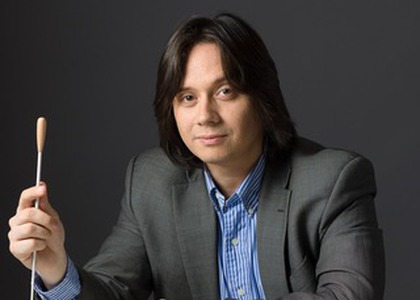> [Archived] Interviews

Interview with conductor Gabriel Bebeselea
On Thursday and Friday, the 4th and 5th of March, the "George Enescu" Philharmonic in the capital will perform two concerts where the public will be able to occupy 30% of the seats available in the Great Hall of the Romanian Athenaeum. The concerts will be performed by pianist Simon Trpceski and will be conducted by Gabriel Bebeșelea.
On Thursday, March 4th, at the Romanian Athenaeum, you will conduct the George Enescu Philharmonic Orchestra. How do you feel about coming back to the public?
First of all, I must mention that we musicians cannot operate without an audience, because in the music we create, during the concerts it is for the spectator in the hall and not only that, but the audience is an active participant in the sound and acoustics of the room and then, of course, it is not just about the energy that the audience conveys to us. , but about the sound that we manage to make, as long as the audience is in the room. So, inevitably, I can only say that I am very happy to have an audience, even if it is not the full capacity of the room covered.
Joining the George Enescu Philharmonic Orchestra will be soloist, pianist Simon Trpceski. In the winter of 2020, you were together on the stage of the Transylvanian Philharmonic, when Concert No. 5 The Imperial by Ludwig van Beethoven was interpreted. This time, Thursday, will be in the program Concert No. 1 for piano and string orchestra by Dmitri Shostakovich. How do you approach this work compared to Beethoven?
With Simon Trpceski we have a musical friendship for many years. We met on a lot of stages and did Concerto No. 1 by Shostakovich, together. It's a neoclassical work, which is why our approach is in this direction accomplished, and that is why we have surrounded this work with classical compositions from Viennese classicism, by Mozart and Haydn. Simon Trpceski is a pianist of a particular refinement and manages to create sounds and states, absolutely out of the ordinary. When I did this concert with him, there was a very interesting communion in the sound of the string orchestra and the solo trumpet, with that of the piano, because, I repeat, there is a pianist who is looking very hard, who wants to discover more, what is going on behind the sonatas. I am referring now, first of all, to what the emotional states involve in this concert. So, I'm sure the public will notice this peculiar refinement of the pianist, Simon Trpceski.
The program will be complemented by the overture of Tito's Clemency, Wolfgang Amadeus Mozart and the Military Symphony by Joseph Haydn. How do you motivate the choice of these works, alongside the piano concerto by Shostakovich?
There is a central element, which connects all three works of the concert with the George Enescu Philharmonic, namely, the military character, dominated by the presence of the trumpet. All three works, Mozart, the overture to Tito's Clemency, Concerto No. 1 for piano by Shostakovich and Haydn, the Military Symphony, have as their central point these instruments the trumpet, precisely to bring before the other certain stiles of military music and this gives special energy to all three works and this is the main reason why we chose the three works. Conceptually, they are linked precisely to these military cells, which will come back throughout the history of music, very often. It will also be found in Beethoven, in the Symphony Eroica, will also be found in Mahler, in the Fifth Symphony and so on.
Finally, in terms of the period we are going through, vaccination seems to be the solution to a return to the previous musical life. What do you think? Would you opt for vaccination?
Of course, I opt for vaccination and I advise absolutely everyone to do so, because it is the only way and the only way in which we can actually return, not only to concert halls, but to a life as close to normality as possible. Until vaccination of a large enough population is achieved, it will be extremely difficult to get back to normal life. So, of course, I advise everyone to do so.
Translated by Dărăban Denisa,
University of Bucharest, Faculty of Foreign Languages and Literatures, MTTLC, year I
Corrected by Silvia Petrescu














